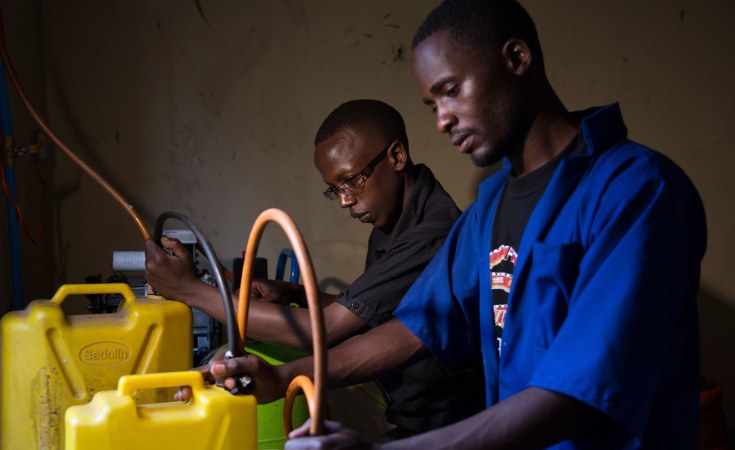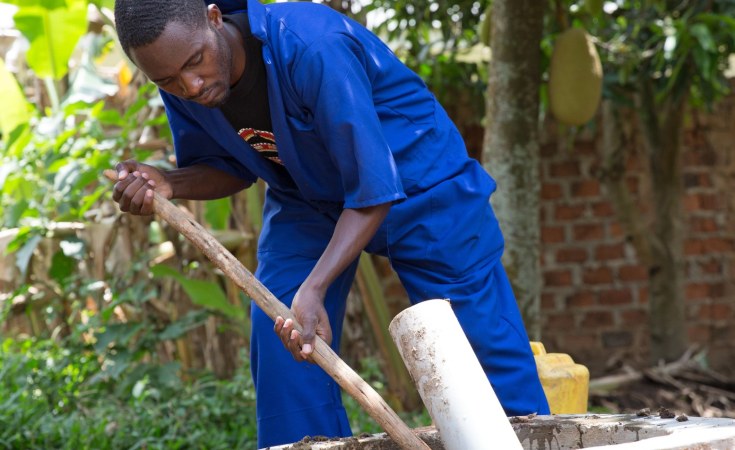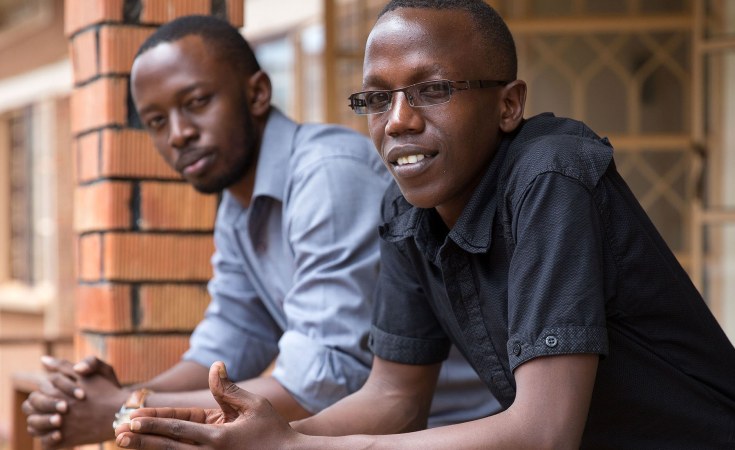Ugandan engineer and innovator Arthur Woniala is passionate about people, entrepreneurship and sustainable solutions to everyday challenges. In 2007 with the help of two friends, he founded Khainza Energy – a small business committed to providing clean, safe and affordable cooking fuel to replace the wood and charcoal fuels that cause respiratory diseases and environmental damage, including destroying forests and eroding soils. He told AllAfrica's Nontobeko Mlambo how Covid-19 is affecting his business, how he is meeting those challenges and spoke about his future plans.
Please give us a summary of the work you do.
Khainza Energy is committed to providing clean, safe and affordable cooking fuel solutions to Ugandans. We install biogas systems in households, schools and agricultural institutions. In order to improve the affordability of biogas, Khainza Energy is pioneering the packaging of biogas in recyclable cylinders for commercial sale to smallholder farmers. Our biogas cylinders reduce the cost of adoption of biogas systems from over U.S.$500 to only U.S.$35!
Through an agreement with Gudie Incubation Center, Khainza Energy has access to a customer base of over 63,720 smallholder farmers, who make up our niche market. Through support from USADF, we are setting up a biogas production and packaging facility to supply this market.
The facility is part of 10 acres of newly acquired real estate, on which we are also setting up Khainza Energy College - a vocational training institute building the capacity of youth to improve food and energy security among remote populations by equipping them with practical skills in biogas installations and other renewable energy interventions such as solar crop dryers and irrigation systems. Through Khainza Energy College, we are creating a network of 10,000 energy entrepreneurs who will support our communities to attain energy and food security through creation of micro energy enterprises which extend simple renewable energy services to end users.
How has your work been affected by COVID-19?
Our business operations stalled almost to a complete halt by March 31st. Our biggest challenge is the loss of newly trained key staff and revenues amounting to over U.S.$37,000 from stalled contracts during the COVID-19 pandemic.
In March and April 2020, we were scheduled to install a 32m3 biogas system, bio-latrines and improved cook stoves at Bishop Cipriano Kihangire Secondary School. We had also secured a contract to deliver an Environmental Conservation and Recycling Course to 1,400 students over a period of eight months. Fountain of Peace Children's Home in Fort Portal approved our proposal to install biogas systems with a total capacity of 87m3. We were also scheduled to install a 32m3 biogas system and briquette production plant at Ibanda Farm Institute.
We had an agreement with the AVSI Foundation in Uganda to deliver biogas systems and briquette production plants to their partners at Maryhill High School, Tororo Girls Secondary School and Ibanda Farm Institute. Unfortunately, the contract expired on June 30th 2020 before we could gain approval for funds.
In an effort to curb the outbreak of Covid-19, these [schools and institutions] were among the first places to be closed by the government. We shall not be in position to implement these installations until the last quarter [October-November] at the very earliest. This implies that our newly trained construction staff of eight youth will be unemployed for the greater part of the year.

The total estimated revenues from all the project activities listed above is U.S.$37,000. Our annual turnover last year (2019) was just over U.S.$42,000. With these contracts indefinitely suspended, our chances of survival were very slim.
What have you done to overcome that, and what are your future plans?
The COVID-19 outbreak has inspired us to iterate our business model and develop new approaches to delivering products and services to customers. We had to go back to the drawing board and re-center ourselves in line with our vision of ensuring that every household in Africa has access to clean cooking fuel.
We had to quickly find low-cost strategies to align our vision with the environment we had plunged into. We have had to identify what is still working, and what has become obsolete.
These are the facts:
There is still clean cooking fuel on the market in the form of liquefied petroleum gas (LPG) and briquettes. It just needs to be delivered to customers. With public transportation disrupted, our customers were stranded at home with no access to cooking fuel.
And while there were severe restrictions on public transportation, we found that tricycles, vans and trucks are allowed to move, provided they are delivering essential services like cooking gas. With many people stranded at home, we acquired a pick-up truck, rented a couple of motorcycles and started making home deliveries for cooking gas and briquettes.
Customers are now making orders through our newly developed Khainza Energy App and other online platforms such as whatasapp, Facebook and website at khainzaenergy.com.
We understand that this is possibly not the last wave of the pandemic. So it is important to set up systems and processes that will enable customers and service providers to adapt quickly.
Khainza Energy is now the company which ensures the safest and most convenient cooking fuel delivery on the market. We make home deliveries in a safe and convenient manner by encouraging customers to place orders and make payments through the mobile application. A prototype of the mobile app can be downloaded on Android devices at this link (No login required).
We ensure maximum safety of our customers by making sure that the cylinders are properly sanitized on delivery. All payments are via mobile money. This ensures limited physical contact. As an incentive to use our service, we also deliver free sanitizer and face masks from the Ministry of Health to our customers.
With increased traffic on our social media sites, we decided to use that opportunity to send out information about Covid-19. We also restructured our Student Training Center on our website to deliver content remotely. We are working with organizations such as Restless Development and the AVSI Foundation to identify opportunities for collaboration, especially on the frontline of this pandemic.

This timely pivot has enabled us to retain our newly recruited biogas masons, who now serve as distribution and marketing agents, and has enabled us to generate much needed revenues for the day-to-day operations of the business.
You received U.S. $91,500 in support from United States African Development Foundation (USADF). How are you using that assistance, and how has it helped your business?
When the country was locked down, we were faced two options – fight, or flight. We confronted the crisis head on, but in order to do this, we needed a partner who was responsive and could adapt to our immediate needs quickly. The United States African Development Foundation was that partner. We explained our immediate needs and strategy through our mentors at Echoing Green. We submitted a brief business plan, explaining that we wanted to provide a link for energy services through LPG delivery.
USADF and Echoing Green were very responsive to our needs, and provided immediate assistance, which enabled us to develop the Khainza Energy App. Through USADF support, we have acquired a pick-up truck to facilitate home deliveries for LPG, briquettes and improved cook stoves. We are also in the process of acquiring a [freight] tri-cycle to facilitate last-mile deliveries.
We cleared payments for state-of-the-art biogas packaging equipment in January 2020. However, they have not been cleared for shipping due to restrictions in China. We shall not be able to transfer the land title [for the10 acres of land for the biogas production plant and Khainza Energy College] to our names until the coronavirus pandemic is dealt with, because the Uganda Land Board is closed.
The biggest challenge about our pivot was marketing and distribution. Much as we have the skilled youth who are willing to provide labor, we needed to set up key infrastructure to support our new business model. We created this video.
Through support from USADF, we are now confident that we shall be able to generate much needed revenues, which will enable us to retain our newly skilled youth until our contracts are flagged off.
We are truly grateful to allAfrica.com for giving us access to a rich network of policy makers, health professionals, students and community advocates in South Africa, Kenya, Nigeria and Senegal.
Our next hurdle is acquiring inventory (cylinders and accessories) to serve our customer base of 63,720 small holder farmers. We believe that this is only the beginning of the COVID-19 pandemic, and that there will be future waves, which might necessitate more drastic interventions. In this regard, we would like to transform safe, convenient fuel delivery into a fully sustainable business. We are seeking funding of U.S.$75,000 to invest directly in the distribution and supply of LPG to small holder farmers living in off-grid markets.
We believe that with such networks in place, our communities will be in position to fend off the pandemic, without significant effects on people's well being, the environment or the economy.


